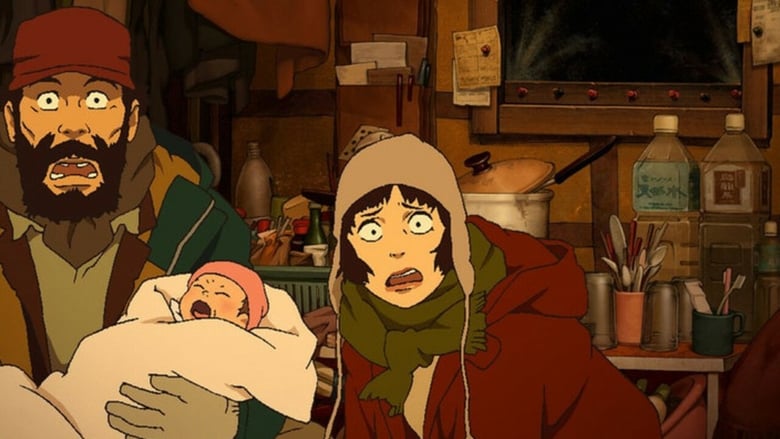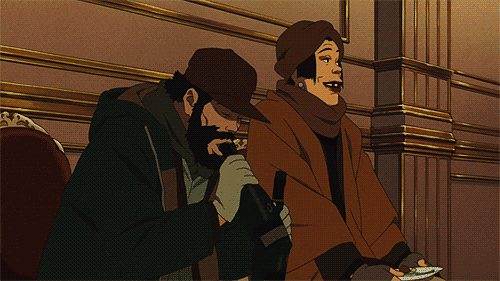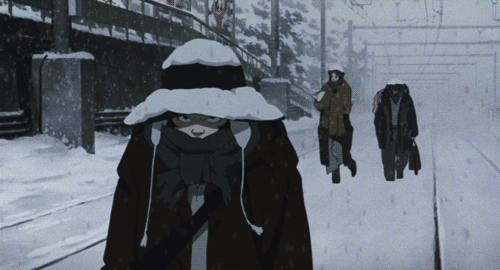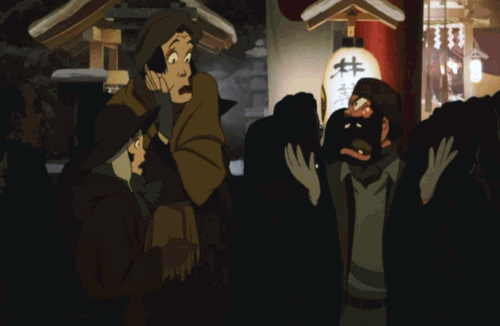← Back to Reviews

in
Tokyo Godfathers (Sub) Status: COMPLETE
Movie

UUUGGGHHH... here we are, the final Satoshi Kon movie other than that one called Dreaming Machine he never finished. You know I saved this one for last because I was the least interested in it?
I have not been particularly generous towards these movies.
Perfect Blue? One part obvious, one part boring, one part excellent.
Millennium Actress? Cruddy romance and a waste of talent.
Paprika? It was... fun... the story was a total mess though.
And now Tokyo Godfathers? Jeez, I wasn't even looking forward to this one. I've heard of Perfect Blue and Paprika for years and I thought Millennium Actress had an great concept, but Tokyo Godfathers? I've only ever heard Tokyo Godfathers mentioned in conversations directly relating to Satoshi Kon.
I don't know ANYTHING about this movie beyond what I can divine from the poster.
*SIGH* Alright, surely the very last Satoshi Kon movie I watch couldn't possibly be my favOF COURSE IT IS THIS IS OBVIOUS DRAMATIC IRONY.

Movie

UUUGGGHHH... here we are, the final Satoshi Kon movie other than that one called Dreaming Machine he never finished. You know I saved this one for last because I was the least interested in it?
I have not been particularly generous towards these movies.
Perfect Blue? One part obvious, one part boring, one part excellent.
Millennium Actress? Cruddy romance and a waste of talent.
Paprika? It was... fun... the story was a total mess though.
And now Tokyo Godfathers? Jeez, I wasn't even looking forward to this one. I've heard of Perfect Blue and Paprika for years and I thought Millennium Actress had an great concept, but Tokyo Godfathers? I've only ever heard Tokyo Godfathers mentioned in conversations directly relating to Satoshi Kon.
I don't know ANYTHING about this movie beyond what I can divine from the poster.
Originally Posted by Me Looking At The Poster
It... looks like a family. And a family means drama. And drama usually sucks.

And "dramatic irony" is extremely relevant to Tokyo Godfathers because Tokyo Godfathers is all about it.
The basic premise of Tokyo Godfathers is that one day three homeless people, a girl and two men (one of which is a flamboyant gay transvestite), happen upon a baby abandoned in the garbage. The older man, Gin, and the younger girl, Miyuki are in favor of turning it over to the police, but the gay man, Hana, argues that if it were handed over to the police it would be returned to it's parents who've demonstrated that they can't take care of it, evidenced by where they found it.
The three take to caring for the baby until Hana finally comes around and agrees to try and find it's parents to see if they can convince him that they deserve to have her back.
This simple premise is readily and easily picked apart, but it escapes my wrath on the grounds that the main characters in question probably aren't very smart which is reinforced by the numerous references to their pasts which frame them all as fallible in some way and the fact that Hana at one point finally agrees to go to the police which Miyuki points out was a blatant waste of their time.
While I would normally take this line from Miyuki and wring it in front of Tokyo Godfathers' face and say, "SEE!? YOU'VE BEEN WASTING MY TIME! YOU EVEN ADMITTED IT!", I won't.
Because...
I don't feel like the time was wasted.
During the three's trek back and forth throughout the city we as the audience not only learn about them, but the three in question also learn about each other in addition to their investigation as to the baby's parents.
Their homelessness is portrayed quite unflinchingly. They're dirty, they smell, they're missing teeth, they live in ramshackle shelters, they scavenge nearly all their food and clothing, they're looked down on by nearly everyone around them, and sometimes they even get beat up. It's TERRIBLE, and yet they still manage to stick by each other even after they hurl both fists and insults at each other.
I LIKE these characters! They've got it so bad, but they have such an energy that I can't help but root for them.
Gin and Miyuki could easily crumble into basic gender stereotypes, but I'm glad both of them are treated and treat each other largely just as friends with their own reasons for being in the situations they find themselves in. They've both done bad things which they're not proud of, and they're both working to get over them in their own ways.
Hana is, I guess, an attempt to bridge the gap between them. Hana doesn't so much have baggage as much as he seems to be a result of the circumstances he puts himself in. He used to be a drag queen even though his personality worked against him and he latches on to Gin even though they're constantly at odds.

I REALLY HATE the flamboyant gay character archetype. They offend me to no end, but I can totally dig Hana for two reasons:
1.) He makes sense within the context of the setting. The character's making the behavior, the behavior isn't making the character.
2.) We need SOMEBODY to compensate for Gin and Miyuki being miserable sadsacks all the time. Hana offers a refreshingly optimistic counterbalance to the negativity bred by the other two's personal baggage and homelessness. Not to mention we've got an easy in-character excuse to take care of the baby and play mama.
Hana also has some great moments to shine throughout the movie, particularly when he goes on one of the most long and impressive rants I've heard since Clark Griswold in Christmas Vacation and it's fully animated.
Actually, the animation in general is fantastic and at multiple points throughout the movie I was wondering if it really needed to be an animated movie in the first place.
It could totally have been made live-action.
Buuuttt...

Ehhh... I dunno. I feel it would be missing something. That special spark that you can only get with animation. Maybe it'd be a little too real otherwise?
Much of the humor comes from the different characters' reaction shots which reminds me... this is easily the funniest of Satoshi Kon's movies.
It's not an all-out comedy of course, but it has many cute little genuine moments of humor all throughout. It definitely got a couple giggles out of me.
BUT ENOUGH HUMOR.

THIS IS SRS TIME NOW. I GOTTA SAY BAD THINGS ABOUT DA MOVIE.
I felt a little lost a few times between narrative bridges. The characters would come to some sort of realization and I'd be left going, "Wait, what happened? Where are we going now?".
Some plot points didn't connect with me at all, like... at what point did Gin know that the other two had found Sachiko? And how did he figure out that she lied? We get contradictory evidence well before Gin takes off to go find the other two so what's the deal? What did he learn?
Not only that, but since Tokyo Godfathers is basically a story of dramatic ironies, it becomes a little confusing when the conveniently associated characters start talking about associated things. What's Gin's deal with the guy at the party? Supposedly he's to blame for him losing his family...? I'm probably right in guessing that that he was just acting out against someone who isn't really to blame for the debts he built up, but I still shouldn't feel like I missed some important dialog that expounded more clearly on their relationship.
Onto more egregious issues, WHAT'S THE DEAL WITH THAT SHOOTER GUY? Miyuki gets taken hostage and the kidnapper takes her to his home and just leaves her there to hang out with his wife... for some reason?
He never comes back and the characters just leave. WHAT WAS THAT ABOUT!?
The kidnapper and his wife don't speak Japanese so I didn't get their subtitles, so hopefully they explain it in their dialog, but even the characters themselves demonstrate an extremely limited degree of understanding of the language, so how much are we betting that most Japanese audiences aren't also seeing this massive plothole?
It'd be one thing if I felt like Miyuki was being held captive and she convinces the wife to let her go, but the interactions lead me to believe that the wife is just blissfully unaware of the fact that her husband is going around shooting up parties! o_O
Another thing is I wish there was a little bit more backing music, particularly at the end.
Also I would have preferred a bit heavier theming. If the dramatic ironies were only there to be dramatic ironies then I wish there was a more apparent overaching theme.
The whole reason I started watching these movies was because I finished watching Paranoia Agent for the third time and it finally struck me: "This is genius." What I really liked about Paranoia Agent is it's a story about a very singular specific theme which it explores from the opening scene of the series all the way to the series end credits. It's intention wasn't explicitly apparent at first, but the message and theme it wanted to exercise was made increasingly apparent through it's many-angled approach which nearly all, however subtly, fed into the primary idea it was trying to present to us.
Out of all of these movies I can't fairly say that any one of them managed the same feat at anywhere near the same level of coherence and focus as Paranoia Agent, which is disappointing.
There is however another thing that Paranoia Agent did which every other Satoshi Kon movie did EXCEPT Tokyo Godfathers: play with reality.
There's like one or two very brief scenes where we see the characters' imaginations run away with them, but this is easily the most, shall we say, "stable?", of his movies?
I guess after Perfect Blue and Millennium Actress, we just hit a strange low point in mind****ery before he stuck his head in a Sutter Cane book and came out talking about how Sanrio is the opiate of the masses and how getting dream raped as a butterfly by a tentacled paraplegic old plant man could be really sexy.

The basic premise of Tokyo Godfathers is that one day three homeless people, a girl and two men (one of which is a flamboyant gay transvestite), happen upon a baby abandoned in the garbage. The older man, Gin, and the younger girl, Miyuki are in favor of turning it over to the police, but the gay man, Hana, argues that if it were handed over to the police it would be returned to it's parents who've demonstrated that they can't take care of it, evidenced by where they found it.
The three take to caring for the baby until Hana finally comes around and agrees to try and find it's parents to see if they can convince him that they deserve to have her back.
This simple premise is readily and easily picked apart, but it escapes my wrath on the grounds that the main characters in question probably aren't very smart which is reinforced by the numerous references to their pasts which frame them all as fallible in some way and the fact that Hana at one point finally agrees to go to the police which Miyuki points out was a blatant waste of their time.
While I would normally take this line from Miyuki and wring it in front of Tokyo Godfathers' face and say, "SEE!? YOU'VE BEEN WASTING MY TIME! YOU EVEN ADMITTED IT!", I won't.
Because...
I don't feel like the time was wasted.
During the three's trek back and forth throughout the city we as the audience not only learn about them, but the three in question also learn about each other in addition to their investigation as to the baby's parents.
Their homelessness is portrayed quite unflinchingly. They're dirty, they smell, they're missing teeth, they live in ramshackle shelters, they scavenge nearly all their food and clothing, they're looked down on by nearly everyone around them, and sometimes they even get beat up. It's TERRIBLE, and yet they still manage to stick by each other even after they hurl both fists and insults at each other.
I LIKE these characters! They've got it so bad, but they have such an energy that I can't help but root for them.
Gin and Miyuki could easily crumble into basic gender stereotypes, but I'm glad both of them are treated and treat each other largely just as friends with their own reasons for being in the situations they find themselves in. They've both done bad things which they're not proud of, and they're both working to get over them in their own ways.
Hana is, I guess, an attempt to bridge the gap between them. Hana doesn't so much have baggage as much as he seems to be a result of the circumstances he puts himself in. He used to be a drag queen even though his personality worked against him and he latches on to Gin even though they're constantly at odds.

I REALLY HATE the flamboyant gay character archetype. They offend me to no end, but I can totally dig Hana for two reasons:
1.) He makes sense within the context of the setting. The character's making the behavior, the behavior isn't making the character.
2.) We need SOMEBODY to compensate for Gin and Miyuki being miserable sadsacks all the time. Hana offers a refreshingly optimistic counterbalance to the negativity bred by the other two's personal baggage and homelessness. Not to mention we've got an easy in-character excuse to take care of the baby and play mama.
Hana also has some great moments to shine throughout the movie, particularly when he goes on one of the most long and impressive rants I've heard since Clark Griswold in Christmas Vacation and it's fully animated.
Actually, the animation in general is fantastic and at multiple points throughout the movie I was wondering if it really needed to be an animated movie in the first place.
It could totally have been made live-action.
Buuuttt...

Ehhh... I dunno. I feel it would be missing something. That special spark that you can only get with animation. Maybe it'd be a little too real otherwise?
Much of the humor comes from the different characters' reaction shots which reminds me... this is easily the funniest of Satoshi Kon's movies.
It's not an all-out comedy of course, but it has many cute little genuine moments of humor all throughout. It definitely got a couple giggles out of me.
BUT ENOUGH HUMOR.

THIS IS SRS TIME NOW. I GOTTA SAY BAD THINGS ABOUT DA MOVIE.
I felt a little lost a few times between narrative bridges. The characters would come to some sort of realization and I'd be left going, "Wait, what happened? Where are we going now?".
Some plot points didn't connect with me at all, like... at what point did Gin know that the other two had found Sachiko? And how did he figure out that she lied? We get contradictory evidence well before Gin takes off to go find the other two so what's the deal? What did he learn?
Not only that, but since Tokyo Godfathers is basically a story of dramatic ironies, it becomes a little confusing when the conveniently associated characters start talking about associated things. What's Gin's deal with the guy at the party? Supposedly he's to blame for him losing his family...? I'm probably right in guessing that that he was just acting out against someone who isn't really to blame for the debts he built up, but I still shouldn't feel like I missed some important dialog that expounded more clearly on their relationship.
Onto more egregious issues, WHAT'S THE DEAL WITH THAT SHOOTER GUY? Miyuki gets taken hostage and the kidnapper takes her to his home and just leaves her there to hang out with his wife... for some reason?
He never comes back and the characters just leave. WHAT WAS THAT ABOUT!?
The kidnapper and his wife don't speak Japanese so I didn't get their subtitles, so hopefully they explain it in their dialog, but even the characters themselves demonstrate an extremely limited degree of understanding of the language, so how much are we betting that most Japanese audiences aren't also seeing this massive plothole?
It'd be one thing if I felt like Miyuki was being held captive and she convinces the wife to let her go, but the interactions lead me to believe that the wife is just blissfully unaware of the fact that her husband is going around shooting up parties! o_O
Another thing is I wish there was a little bit more backing music, particularly at the end.
Also I would have preferred a bit heavier theming. If the dramatic ironies were only there to be dramatic ironies then I wish there was a more apparent overaching theme.
The whole reason I started watching these movies was because I finished watching Paranoia Agent for the third time and it finally struck me: "This is genius." What I really liked about Paranoia Agent is it's a story about a very singular specific theme which it explores from the opening scene of the series all the way to the series end credits. It's intention wasn't explicitly apparent at first, but the message and theme it wanted to exercise was made increasingly apparent through it's many-angled approach which nearly all, however subtly, fed into the primary idea it was trying to present to us.
Out of all of these movies I can't fairly say that any one of them managed the same feat at anywhere near the same level of coherence and focus as Paranoia Agent, which is disappointing.
There is however another thing that Paranoia Agent did which every other Satoshi Kon movie did EXCEPT Tokyo Godfathers: play with reality.
There's like one or two very brief scenes where we see the characters' imaginations run away with them, but this is easily the most, shall we say, "stable?", of his movies?
I guess after Perfect Blue and Millennium Actress, we just hit a strange low point in mind****ery before he stuck his head in a Sutter Cane book and came out talking about how Sanrio is the opiate of the masses and how getting dream raped as a butterfly by a tentacled paraplegic old plant man could be really sexy.

I love the reality-bending, but of his four completed movies, I'm going to have to say that Tokyo Godfathers is easily my favorite.
Odds are good that my appreciation for it may even reach Friggen' Awesome levels on repeated viewings. Time will tell.
Final Verdict: [Friggen' Awesome][Pretty Good][Meh...][Just... Bad][Irredeemably Awful]
Odds are good that my appreciation for it may even reach Friggen' Awesome levels on repeated viewings. Time will tell.
Final Verdict: [Friggen' Awesome][Pretty Good][Meh...][Just... Bad][Irredeemably Awful]
